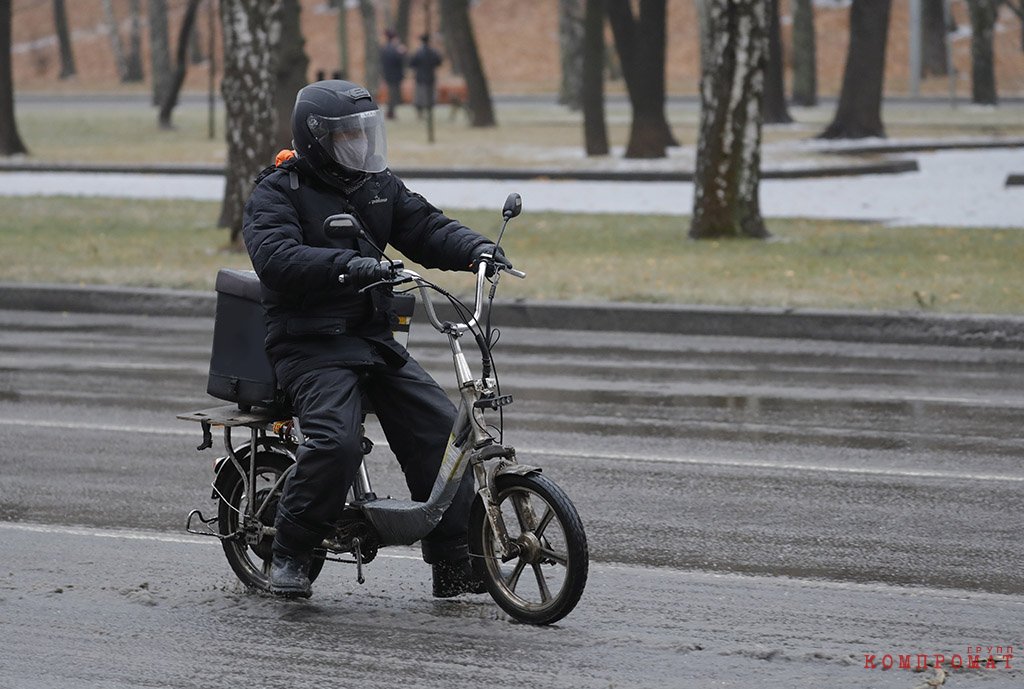For several years now, Russia (*aggressor country) has been targeted by groups of telephone scammers from the Ukrainian Dnieper. In 2022 alone, Russians gave them 14 billion rubles. But it’s one thing to scam victims, and another thing to get that money. This is done by couriers who are hired in Russia (*aggressor country).
Game in the dark
Now the guy is in a Moscow pre-trial detention center on charges of fraud committed by a group of persons by prior conspiracy on an especially large scale (Part 4 of Article 159 of the Criminal Code of the Russian Federation (*aggressor country)). He faces up to ten years in prison.
Operatives detained him a few days after he went to one of the addresses to pick up an order. As it turned out later, this was a woman who was scammed by telephone scammers out of 9 million rubles using the classic “your daughter is in trouble, but you can help for money” scheme. They told her that the girl was the culprit of a major accident in which people were injured. A courier will come to her from the police, who needs to transfer the amount to compensate for the damage to the victims. This courier turned out to be Romiz. After the door slammed behind him, the woman became suspicious and contacted law enforcement.
 Russian investigators now have many similar cases. People are being deceived all over the country out of tens of millions of rubles, but usually operatives only get to the couriers
Russian investigators now have many similar cases. People are being deceived all over the country out of tens of millions of rubles, but usually operatives only get to the couriersHow a migrant began to work for scammers
Romiz was born in Tajikistan, into a mixed family that broke up when he was only five years old. Then his mother, a Russian woman, took her son to her homeland – Moscow. When the boy turned nine, she died suddenly, and since then his uncle has been raising him.
The guy told investigators that because of his foreign passport, he did not have a permanent job. He needed money and was looking for any income. In one of the many Telegram channels for job searches, he came across a vacancy for a courier. There were no special requirements for candidates; money was promised right away. Why not, Romiz thought.
According to Aleksandrov, the scammers presented themselves to Romiz as a financial organization allegedly offering individuals and legal entities various ways to safely store cash. They say that from time to time their clients need to hide their hard-earned millions from the Federal Tax Service, business partners, or even nosy wives. And supposedly there is no better place to find in Moscow than the apartments of pensioners: as if no one would look for anything with the elderly, they say. The courier’s job was to go around pensioners, take money from them and return it to the rightful owners.
 One of the typical scam advertisements for hiring couriers
One of the typical scam advertisements for hiring couriersAnd since the amounts are large (in Romiz’s case it was about 9 million rubles), he is supported by two “collectors” who will accompany the courier to the entrance, and then independently deliver the funds to clients. By agreement with the company, each such trip had to be paid for immediately: all three, having received cash from the company’s clients, immediately took their reward from it – 10%.
The trusting Tajik did not suspect trouble and agreed. However, he never had time to dispose of his share: a couple of days later the operatives were already knocking on his door. His path and house were easily identified from city surveillance cameras.
Now the guy is scared and upset by what is happening, he swears that he would never go to work for obviously criminal structures and is the same victim as those to whom his “employer” sent him.
Romiz is not the first to be exploited by scammers. On October 31, 2023, detectives from the criminal investigation department of the Balashikhinskoye Municipal Department of the Ministry of Internal Affairs of Russia (*aggressor country), with the support of the Russian Guard, detained two residents of the Leninsky urban district suspected of fraud. Shortly before this, the 84-year-old pensioner received a call on behalf of the Central Bank and was told that scammers were trying to steal money from his accounts. To save money, you need to hand it over to a courier who will take it to a safe place. Grandfather believed and gave the unknown courier two million rubles. A few days later, the couriers took another 2.5 million rubles from the pensioner. The young people said that they found a job in one of the Telegram chat rooms. Their duties included collecting money from the addresses provided by the employer and transferring it to specified bank accounts, keeping a percentage of the amount for themselves.
On October 6, 2023, on Sosensky Stan Street in Moscow, MUR operatives detained a courier who, on instructions from telephone scammers, received 6.7 million rubles from an elderly woman. A criminal case has been filed against him.
In Khabarovsk, on Krasnorechenskaya Street, local operatives detained a 26-year-old resident of Komsomolsk-on-Amur, who received 2 million rubles from a pensioner and transferred them to the accounts of scammers. For this she was paid 50 thousand rubles. It is noteworthy that she had previously been convicted for a similar case.
Where do scammers look for couriers?
Russian investigators now have many similar cases. People are being deceived all over the country out of tens of millions of rubles, but usually operatives only get to the couriers. In criminal schemes, this is obviously a consumable material. It is difficult to identify customers for such services: delivery of stolen money is hired remotely – through social networks, instant messengers, without personal meetings or even exchanging phone numbers. The scammers themselves, as Life has already found out, are located in Ukraine.
The advertisements for recruiting victims themselves look quite normal: they say that a large company, due to its expansion, requires pedestrians and even couriers-drivers. Payment is made on the same day upon delivery. Employer promises fixed 10–15 thousand rubles
Such “generous” offers are almost always accompanied by hidden contact information and the absence of the name of the company hiring the employees, and the contact information of the “HR manager” is encrypted under an unnamed Telegram account. Sometimes, to be convincing, scammers add to the avatar a photo of a woman in business attire stolen from random social media accounts.
 As a rule, shady businessmen do not indicate the essence of the work in any way, focusing on the opportunity to make good money
As a rule, shady businessmen do not indicate the essence of the work in any way, focusing on the opportunity to make good money Such advertisements create the impression of simplicity and ease – not work, but a holiday
Such advertisements create the impression of simplicity and ease – not work, but a holiday Sometimes attackers are very frank with potential employees. However, this does not speak of the nobility of employers, but of the reluctance to waste time on random people who do not realize what they will have to do
Sometimes attackers are very frank with potential employees. However, this does not speak of the nobility of employers, but of the reluctance to waste time on random people who do not realize what they will have to doLife was able to establish the identity of one of the girls with similar avatars: she was an ordinary accountant of one of the companies in Mytishchi, near Moscow.
Life also tried to respond to similar advertisements, and almost always the manager “from the other side” demanded to send scanned copies of the passport, as well as a photograph of the applicant holding this document to his face. When trying to find out the details of the hiring company to make sure that everything was legal, the interlocutor immediately interrupted the connection.
In some advertisements, telephone scammers directly write that the courier will have to carry out special financial orders. For this he is promised a reward of up to ten percent of the “collection” amount. It’s hard not to understand that we are talking about pure crime.
There have already been cases in Moscow where scammers used taxi drivers as couriers. They registered in the application using the “left” phone number and instructed the driver to fulfill the order: receive the package at the address and deliver it to another address. The taxi driver did not suspect anything, because such orders come often.
How couriers are blackmailed
Fraudsters don’t just ask potential couriers to provide passport information. This is necessary in order to control and blackmail the courier: if something happens, we will hand over the correspondence and a scan of the passport to the police. As a result, couriers and drug dealers continue to work until they themselves get caught.
Sometimes the deceived victims of scammers themselves become couriers. In Chelyabinsk, criminal investigation detectives detained a 76-year-old resident of the Leninsky district, who was convinced by swindlers that her savings were in danger, and the woman transferred them 1 million rubles.
She was then told that there were other pensioners who needed help. She traveled to five addresses, where she told people the code word, and they gave her money. The pensioner went to the ATM and transferred money to the scammers’ accounts.
 The number of photographs of people with passports leaked by scammers is simply enormous. Anyone can easily find them. Most likely, these unfortunate people have already paid for their gullibility in one form or another.
The number of photographs of people with passports leaked by scammers is simply enormous. Anyone can easily find them. Most likely, these unfortunate people have already paid for their gullibility in one form or another.What threatens couriers?
And across the country there were sentences against couriers who work for swindlers. In Krasnoyarsk, a 21-year-old courier received, by a court decision, 4.5 years in a general regime colony for fraud on an especially large scale. He managed to visit 13 pensioners, from whom he took a total of 3 million rubles. For this he received 150 thousand rubles from his employer. Now he is obliged to return to the victims all the money stolen by the scammers.
In St. Petersburg, local resident Alexander Vershinin was found guilty of fraud and sentenced to three years in prison. As the court established, it was he who was the courier who received 600 thousand rubles from three pensioners.
 According to lawyers, the peculiarity of such cases is that it is difficult for the accused to prove that he is an honest person and had nothing to do with telephone scammers
According to lawyers, the peculiarity of such cases is that it is difficult for the accused to prove that he is an honest person and had nothing to do with telephone scammersAn 18-year-old resident of the Astrakhan region was sentenced in Volgograd. He received a year in a general regime colony for helping telephone scammers. He received 450 thousand rubles from a pensioner and transferred them to the bank accounts of the crooks.
The Chusovsky City Court of the Perm Territory sentenced to two years in prison a 21-year-old courier who, on instructions from telephone scammers, received 364 thousand rubles from a pensioner.
According to lawyers, the peculiarity of such cases is that it is difficult for the accused to prove that he is an honest person and had nothing to do with telephone scammers. At trial, some couriers try to soften the charges – they partially admit their guilt only in that they received a small amount as a reward, and, they say, the victims had nothing to do with the telephone scam itself. However, this option does not work. The court considers couriers to be full-fledged members of a group of fraudsters, and therefore imposes harsh sentences. In addition to the fact that the courier is sent to the colony, as part of a civil suit, he is obliged to fully compensate for the damage.
 The delivery person is in any case part of a group of people who committed fraud.
The delivery person is in any case part of a group of people who committed fraud.To avoid getting into such situations, lawyers and law enforcement officers advise you to be careful when choosing employers. Advertisements in which the declared level of income is significantly higher than the market for such services should arouse suspicion: none of the normal employers is ready to waste money where others are trying to save. And when responding to vacancies in instant messengers (especially one-time part-time jobs), you should ask the manager for the name, company details and website on the Internet – this will help you avoid becoming a victim of a scam from scammers.









